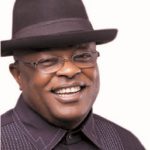How Lionel Richie’s song ‘Baby’ became Kenny Rogers hit song ‘Lady’

The death of Kenny Rogers at 81 has sparked a recollection of great moments some stars had with the legendary country music singer. In an earlier interview with AP Lionel Richie who wrote the 1980 hit song Lady which kept Rogers on top of the hit-chart for weeks recounted how he changed the original title of the song from Baby to Lady upon his encounter with Kenny Rogers.
“One of his biggest successes was “Lady,” written by Lionel Richie, a chart topper for six weeks straight in 1980. Richie said in a 2017 interview with the AP that he often didn’t finish songs until he had already pitched them, which was the case for “Lady.”
“In the beginning, the song was called, ‘Baby,’” Richie said. “And because when I first sat with him, for the first 30 minutes, all he talked about was he just got married to a real lady. A country guy like him is married to a lady. So, he said, ‘By the way, what’s the name of the song?’” Richie replies: “Lady.”
Rogers’ family is planning a private service “out of concern for the national COVID-19 emergency,” a statement posted early Saturday read. A public memorial will be held at a later date.
Actor-singer Kenny Rogers, the smooth, Grammy-winning balladeer who spanned jazz, folk, country and pop with such hits as “Lucille,” “Lady” and “Islands in the Stream” and embraced his persona as “The Gambler” on record and on TV died Friday night has continued to receive rave commendations since his death.
He died at home in Sandy Springs, Georgia, representative Keith Hagan told The Associated Press. He was under hospice care and died of natural causes, Hagan said.
The Houston-born performer with the husky voice and silver beard sold tens of millions of records, won three Grammys and was the star of TV movies based on “The Gambler” and other songs, making him a superstar in the ‘70s and ’80s. Rogers thrived for some 60 years before retired from touring in 2017 at age 79. Despite his crossover success, he always preferred to be thought of as a country singer.
“You either do what everyone else is doing and you do it better, or you do what no one else is doing and you don’t invite comparison,” Rogers told The Associated Press in 2015. “And I chose that way because I could never be better than Johnny Cash or Willie or Waylon at what they did. So I found something that I could do that didn’t invite comparison to them. And I think people thought it was my desire to change country music. But that was never my issue.”
A true rags-to-riches story, Rogers was raised in public housing in Houston Heights with seven siblings. As a 20-year-old, he had a gold single called “That Crazy Feeling,” under the name Kenneth Rogers, but when that early success stalled, he joined a jazz group, the Bobby Doyle Trio, as a standup bass player.
But his breakthrough came when he was asked to join the New Christy Minstrels, a folk group, in 1966. The band reformed as First Edition and scored a pop hit with the psychedelic song, “Just Dropped In (To See What Condition My Condition Was In).” Rogers and First Edition mixed country-rock and folk on songs like “Ruby, Don’t Take Your Love To Town,” a story of a Vietnam veteran begging his girlfriend to stay.
After the group broke up in 1974, Rogers started his solo career and found a big hit with the sad country ballad “Lucille,” in 1977, which crossed over to the pop charts and earned Rogers his first Grammy. Suddenly the star, Rogers added hit after hit for more than a decade.
“The Gambler,” the Grammy-winning story song penned by Don Schlitz, came out in 1978 and became his signature song with a signature refrain: “You gotta know when to hold ‘em, know when to fold ’em.” The song spawned a hit TV movie of the same name and several more sequels featuring Rogers as professional gambler Brady Hawkes, and led to a lengthy side career for Rogers as a TV actor and host of several TV specials.
Rogers’ family is planning a private service “out of concern for the national COVID-19 emergency,” a statement posted early Saturday read. A public memorial will be held at a later date.
Additional reports from USAToday.com








